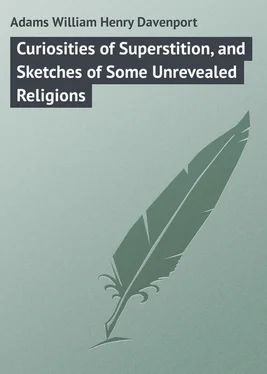William Adams - Curiosities of Superstition, and Sketches of Some Unrevealed Religions
Здесь есть возможность читать онлайн «William Adams - Curiosities of Superstition, and Sketches of Some Unrevealed Religions» — ознакомительный отрывок электронной книги совершенно бесплатно, а после прочтения отрывка купить полную версию. В некоторых случаях можно слушать аудио, скачать через торрент в формате fb2 и присутствует краткое содержание. Жанр: foreign_language, foreign_prose, на английском языке. Описание произведения, (предисловие) а так же отзывы посетителей доступны на портале библиотеки ЛибКат.
- Название:Curiosities of Superstition, and Sketches of Some Unrevealed Religions
- Автор:
- Жанр:
- Год:неизвестен
- ISBN:нет данных
- Рейтинг книги:4 / 5. Голосов: 1
-
Избранное:Добавить в избранное
- Отзывы:
-
Ваша оценка:
- 80
- 1
- 2
- 3
- 4
- 5
Curiosities of Superstition, and Sketches of Some Unrevealed Religions: краткое содержание, описание и аннотация
Предлагаем к чтению аннотацию, описание, краткое содержание или предисловие (зависит от того, что написал сам автор книги «Curiosities of Superstition, and Sketches of Some Unrevealed Religions»). Если вы не нашли необходимую информацию о книге — напишите в комментариях, мы постараемся отыскать её.
Curiosities of Superstition, and Sketches of Some Unrevealed Religions — читать онлайн ознакомительный отрывок
Ниже представлен текст книги, разбитый по страницам. Система сохранения места последней прочитанной страницы, позволяет с удобством читать онлайн бесплатно книгу «Curiosities of Superstition, and Sketches of Some Unrevealed Religions», без необходимости каждый раз заново искать на чём Вы остановились. Поставьте закладку, и сможете в любой момент перейти на страницу, на которой закончили чтение.
Интервал:
Закладка:
Curiosities of Superstition, and Sketches of Some Unrevealed Religions
CHAPTER I.
BUDDHISM: ITS ORIGIN AND CEREMONIES
Travelling on the borders of Chinese Tartary, in the country of the Lamas or Buddhists, Miss Gordon Cumming remarks that it was strange, every now and again, to meet some respectable-looking workman, twirling little brass cylinders, only about six inches in length, which were incessantly spinning round and round as they walked along the road. What could they be? Not pedometers, not any of the trigonometrical instruments with which the officers of the Ordnance Survey go about armed? No; she was informed that they were prayer-wheels, and that turning them was just about equivalent to the telling of beads, which in Continental lands workmen may often be seen counting as homeward along the road they plod their weary way.
The telling of beads seems to the Protestant a superfluous piece of formalism: what then are we to think of prayer by machinery? The prayers, or rather invocations, to Buddha – the Buddhists never pray, in the Christian sense – are all closely written upon strips of cloth or paper; the same sentence being repeated some thousands of times. These strips are placed inside a cylinder, revolving on a long spindle, the end of which is the handle. From the wind-cylinder depends a small lump of metal, which, whirling round, communicates the necessary impetus to the little machine, so that it rotates with the slightest possible effort, and continues to grind any required number of acts of worship, while the owner, with the plaything in his hand, carries on his daily work. His religion requires that he should be all his time immersed in holy contemplation of the perfections of Buddha, but to a busy man no such self-absorption is possible. He is content, therefore, to say the sentences aloud at the beginning and end of his devotions, and in the interval twirls slowly, while a tiny bell marks each rotation, and reminds him if he should unconsciously quicken his pace.
Tennyson finely speaks of Prayer as that by which
“The whole round world is every way
Bound by gold chains around the feet of God;”
but no such efficacy can be ascribed to the cylinders of brass, copper, or gold, which are fashionable among the Buddhists. Yet we must not condemn too unreservedly: Prayer, even among Christians, is apt to degenerate into a dull, mechanical uniformity, and to become scarcely less perfunctory than that which the Tibetans grind out of their prayer-machine.
In a Lama temple, Miss Gordon Cumming once saw a colossal prayer-wheel, which might almost have sufficed for the necessities of a nation. It was turned by a great iron crank, which acted as a handle. The cylinder measured about twelve feet in height, and six to eight feet in diameter. Circular bands of gold and vermilion adorned it, each band bearing the well-known Buddhist ascription, or invocation, “To the jewel on the Lotus.” Of this inscription, multiplied on strips of paper and cloth, the cylinder was full, and each time that it revolved on its axis, the devotee was accredited with having uttered the pious invocation just as often as it was repeated within the cylinder. The whole history of Superstition offers scarcely any fact more curious or suggestive than this method of prayer by machinery; and that such a grotesque extravagance should have emanated from so subtle and metaphysical a faith as Buddhism is an anomaly not easily to be explained.
Each votary who is too poor to possess a prayer-wheel of his own, attends the temple, does homage to the head Lama, receives his benediction, and then, squatting in front of the great wheel, he turns the crank on behalf of himself and his family. But if there be a considerable number of worshippers, the priest himself works the handle, that all may participate simultaneously in the act of prayer.
The use of these machines is traced back for fully fourteen centuries, and is supposed to have originated in the belief that it was a meritorious act, and a patent cure for sin, to be continually reading or reciting portions of the sacred books of Buddha. But as many of the people could not read, a substitute had to be found, and it came to be considered sufficient if they turned over the rolled manuscripts which embodied the invaluable precepts. And as a vast amount of time and trouble was saved by this process, a further simplification became possible and popular, – the invention of wheels termed Tehu-Chor , – great cylindrical bands full of prayers; a cord being attached to the base of the band, which, when the cord was pulled, twirled like a children’s toy. Prayer-wheels of this kind are set up in all public places in Tibet, so that the poor who do not possess little pocket Wheels of Devotion may not lose their chance of accumulating merit. In some of the monasteries the rows of small cylinders are so arranged, that the priest, or any passer-by can set them all in simultaneous motion, by just drawing his hand along them.
According to Miss Cumming, who is confirmed by other travellers, the cylinders vary in size, from tiny hand-mills, about as big as a policeman’s rattle, to huge machines, eight or ten feet in diameter, worked by a heavy iron crank, or sometimes by wind or water power. The wind prayer-mills are turned by wings, which, like the cylinder, are plentifully covered with prayers. The water-mills are placed over streams, so as to dispense with human aid, and allow the running water to turn them for the general welfare of the village. Through the cylinder passes a wooden axle, which is fastened to a horizontal wheel, whose cogs are turned diagonally to the water.
“One such group of little mills we noticed,” says Miss Cumming, 1 1 Miss Gordon Cumming, “From the Hebrides to the Himalayas,” ii. 226, 227.
“set in a clear stream half-way between Rarung and Pangi, a lively, rapid river, rushing headlong down the mountain side to join the Sutlej. Having never then heard of prayer-mills, we assumed them to be for corn, as perhaps they were. At all events, we passed them without inspection, to our subsequent infinite regret. These wheels rotate with the action of the water, and so turn the cylinder, which must invariably stand upright. Sometimes several of these are placed almost across the stream, and the rudest form of temple is built over them.
“They are so placed that the wheel must invariably turn from right to left, following the course of the sun; to invert that course would not only involve ill-luck, but would amount to being a sin. Hence the exceeding unwillingness of the people we met to let us tend their little wheels, knowing from sad experience that the English sahibs rather enjoy the fun of turning them the wrong way, and so undoing the efficacy of all their morning’s work.
“Some of the little pocket cylinders are very beautifully wrought; some are even inlaid with precious stones. I saw one great beauty which I coveted exceedingly. The owner would on no account sell it. I returned to the temple next morning, wishing at least to make a drawing of it, but I think he mistrusted me, for he and his plaything had both vanished, and I had to be content with a much simpler one of bronze, inlaid with copper. The people have the greatest reluctance to sell even the ugliest old mills. They cling to them as lovingly as you might do to your dear old Bible; but, as I said before, not merely from the charm of association, but from a dread lest a careless hand should turn them against the sun, and so change their past acts of merit into positive sin. So there was a great deal of talk, and many irons in the fire, before I was allowed to purchase two of these, at a price which would have supplied half the village with new ones.”
Читать дальшеИнтервал:
Закладка:
Похожие книги на «Curiosities of Superstition, and Sketches of Some Unrevealed Religions»
Представляем Вашему вниманию похожие книги на «Curiosities of Superstition, and Sketches of Some Unrevealed Religions» списком для выбора. Мы отобрали схожую по названию и смыслу литературу в надежде предоставить читателям больше вариантов отыскать новые, интересные, ещё непрочитанные произведения.
Обсуждение, отзывы о книге «Curiosities of Superstition, and Sketches of Some Unrevealed Religions» и просто собственные мнения читателей. Оставьте ваши комментарии, напишите, что Вы думаете о произведении, его смысле или главных героях. Укажите что конкретно понравилось, а что нет, и почему Вы так считаете.












